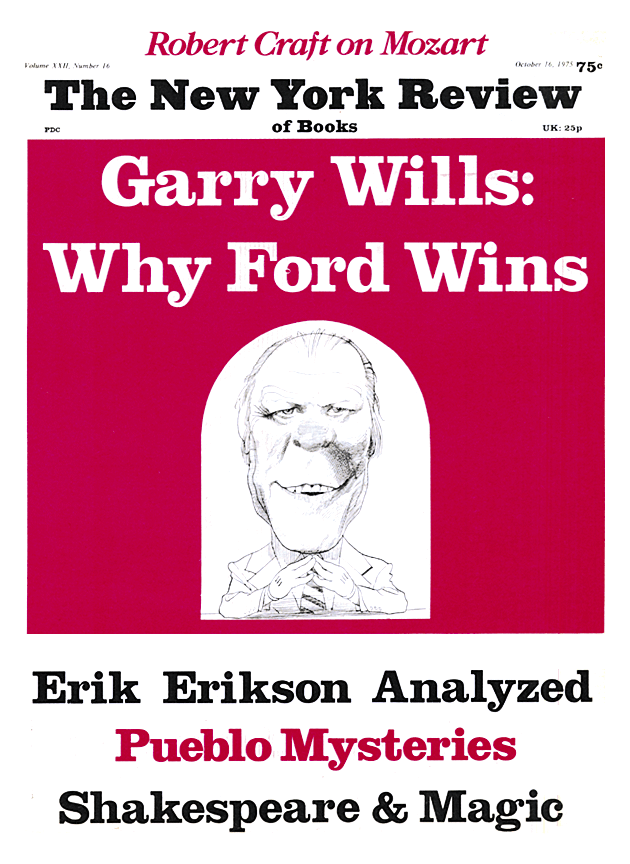In response to:
Yankee Doodle Andy from the August 7, 1975 issue
To the Editors:
William Appleman Williams, as I should have said in my book, is the father of expansionist interpretations of American history. Now he is disturbed by one of his errant children. Let me try to clarify the differences between us, and interpret the extraordinary tone of his review [NYR, August 7].
Fathers and Children traces the family’s central place in early American political symbolism to European familial images of political authority on the one hand, and the facts of colonial household existence on the other. Ideas of republican virtue, rooted in the household order, were embodied in the revolutionary fathers. But the fathers also advanced a market capitalism which undermined republican virtue. This tension between bourgeois and citizen (Marx) is endemic to capitalism; the frontier gave it a particular American character. Westward expansion and Indian removal defined the identity of the new nation, and reconnected succeeding generations to the heroic, revolutionary fathers. Indian land also fuelled the market revolution. Fleeing westward from internal (capitalist) threats to republican virtue, America failed to restore the society of the fathers.
So far Fathers and Children is indebted to and consistent with Williams’s work. But Marxist interpretations glide over the interior of personal and cultural life. Williams may prefer Thucydides to Freud, but Freud’s analysis of language and the family takes us further beneath the American surface than Williams is willing to go. Language, connecting human interior and exterior worlds, reveals how men consciously and unconsciously experience their history. And early American metaphors of personal and political relations in general and Indians in particular are insistently, bizarrely familial. These metaphors make Indians “part of the American family” as “children,” as forbidden and projected parts of the self. They evoke an intimate identification with “the sons of the forest,” who “cling to the exuberant bosom of nature,” and who “glut their vengeance by repeated feasts of [the] innocent blood” of women and children. White rhetoric offers Indian children paternal benevolence to replace dependence on nature. It raises specters of inner division, maternal domination, and primitive violence.
Instead of complaining about multiple uses of the word “primitive,” Williams might explore its meanings—might see at the American core an identification with nature and regenerative violence on the one hand; and a fear of regressive, maternal domination on the other. The fear of the power of women which lies at the heart of liberal, capitalist culture helps explain its patriarchal longings. But Williams, himself nostalgic for a patriarchal upper class, stays away from this subject. (The closest he comes is his fantasy about Playgirl seducing Ms.)
Hence there was a logic of the psyche which led Andrew Jackson from assaulting children of nature to war on “the mother bank.” To call this a “schematic nightmare” avoids the interpretation of Jacksonian bad dreams. For the bank (substitute for the sacrosanct market) tied men to it with “chains of dependence,” chains they thought, going west and conquering Indians, they had escaped. The language of Indian destruction and the bank war suggests a dialectic of image and economy truer, richer, and more disturbing than the America of economic systems and ideas alone. If Williams wants to “cherish” metaphors, why not take more seriously the ones Jackson and other Americans actually used?
Michael Rogin
Middletown, Connecticut
This Issue
October 16, 1975


